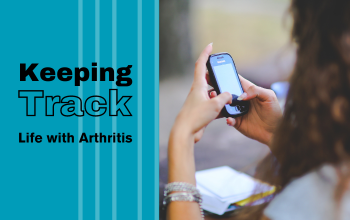COVID Advice you Need to Hear
“I have patients who are scared to leave their homes,” said Dr. Shojania. “But many arthritis patients are not as vulnerable as they may think.”
He added that it’s important for people with arthritis to get outside, exercise and socialize for their wellbeing and mental health.
Dr. Shojania spent six weeks treating patients on the COVID ward at Vancouver General Hospital, between March of 2020 and June of 2021, alongside other rheumatologists who also volunteered their time. He is the head of the University of British Columbia’s Division of Rheumatology, the medical director of the Mary Pack Arthritis Program, and has a private rheumatology practice in Vancouver. He is also part of a Provincial Health Services Authority committee that makes recommendations on COVID-19 vaccinations for vulnerable people with arthritis.
We sat down with Dr. Shojania to address some concerns raised by arthritis patients.

What would you say to people with arthritis who have compromised immune systems and are worried about the fourth wave?
I stress the importance of getting both COVID-19 vaccinations and following the rules laid out by public health. Wear a mask when indoors and wash your hands frequently. Don’t just stay at home and inside. Be social and exercise in the proper, outdoor environment. There are other important risk factors for severe COVID-19 infection including obesity, smoking, type 2 diabetes, hypertension and lung disease. Exercise and lifestyle measures are particularly important. I tell my patients to focus on these factors, which they can improve.
Is there any guidance you can provide about the need for a third dose of the COVID-19 vaccine?
I have two perspectives on this. First, I put myself in the shoes of the patient in front of me. Second, I try to think of the general population. What do I tell my patients? If you are immune compromised (from your disease or the drugs used to treat it), you should probably get a third dose at some point. In theory, if you got the first dose in March and the second in May, you should get a third booster dose eight months later. But when we are in a crisis, we have a chain of command. Dr. Bonnie Henry and other provincial and health authority health officers are the ones to make decisions about third doses.
Regarding the general population in British Columbia, our health officers have some decisions to make. Do we focus on giving a first dose to people in other communities or where there is vaccine hesitancy? If we provide a third dose, who should receive it first? Health care workers treating COVID patients? Vulnerable, immune suppressed patients? Older people? These decisions need to be made on a population basis.
Heading into cold and flu season, how can people with arthritis/compromised immune systems protect themselves from COVID-19?
I don’t like the term “clinically extremely vulnerable” in my practice, but I realize that we need this category for planning purposes. If you are on low-dose methotrexate, I’m not so sure you are vulnerable. If you are on rituximab, you probably are. Do we put these arthritis patients on the same vulnerability level as a cancer patient who just had a bone marrow transplant? We tend to place everyone in the same vulnerability basket and this may unnecessarily increases anxiety for some people.
It’s not black and white. I worry about my patient who has lupus and lung involvement who is also taking prednisone. I’m less worried about my patient on low methotrexate, which is the most common immune medication.
In rheumatology, we try to look at the whole patient: health behaviours, other medical conditions, age, smoking status, and medications. These factors help us determine risk for serious complications.
One of my patients does the stairs at Wreck Beach. Six of those staircases equals one Grouse Grind. She said, “If I keep up my cardio, I could fight a bad lung infection.” I think she’s right. Of course, she got the vaccine, so she is double protected. But people stay at home, become COVID sedentary and this is more worrisome. Fat tissue increases inflammation and worsens arthritis symptoms.
Dr. Bonnie Henry said to exercise and stay social. Most people with arthritis can do this safely. Get vaccinated, wear a mask, wash your hands and follow rules set out by public health.





















































